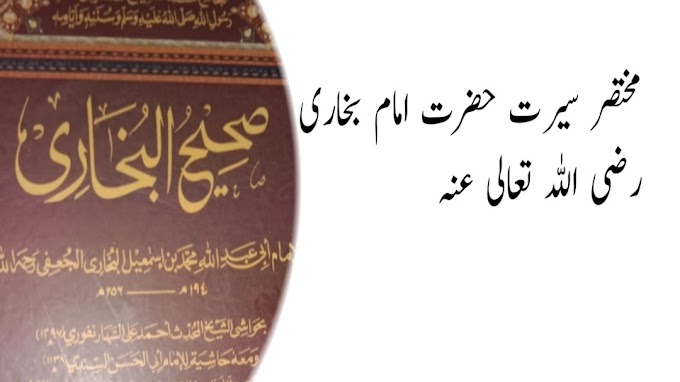Throughout history, countless individuals have come and gone, leaving no lasting trace. However, some personalities remain immortal in the hearts and minds of people due to their knowledge, wisdom, and contributions to society. One such figure is Imam Ahl al-Sunnah, the Reviver of Faith, A'la Hazrat Shah Imam Ahmad Raza Khan (رحمه الله). His legacy continues to inspire millions worldwide.
This blog post highlights the life, education, teachings, and contributions of this great scholar and spiritual leader.
"Imam Ahmad Raza Khan Biography - Islamic Scholar and Jurist"
Birth and Early Life
A'la Hazrat Imam Ahmad Raza Khan (رحمه الله) was born on Saturday, 10th Shawwal 1276 AH (June 14, 1856 CE), at Zuhr (midday) in Jasoli, Bareilly Sharif, India. From a young age, he displayed exceptional intelligence and a deep passion for knowledge.
Education and Scholarship
Imam Ahmad Raza Khan (رحمه الله) began his formal education after his Bismillah ceremony (initiation into learning). At just four years old, he completed the recitation of the entire Quran. By the age of six, he delivered an eloquent speech on the birth of the Prophet ﷺ (Mawlid) in front of a large gathering of scholars, who were amazed by his profound understanding.
He studied a wide range of Islamic sciences, including:
✔ Arabic and Persian Literature
✔ Jurisprudence (Fiqh)
✔ Theology (Aqeedah)
✔ Hadith (Prophetic Traditions)
✔ Tafsir (Quranic Exegesis)
✔ Islamic Astronomy
✔ Numerology and Jafr (Islamic Numerology)
✔ Sufism and Spiritual Sciences
At just 13 years, 10 months, and 5 days old, he completed his Islamic studies and was awarded the Dastaar-e-Fazilat (Turban of Excellence) on 14th Sha‘ban 1286 AH (November 19, 1869 CE).
Teachers and Mentors
A'la Hazrat (رحمه الله) learned from some of the most renowned scholars of his time. His teachers included:
- Mirza Ghulam Qadir Beg Barelwi
- Mawlana Naqi Ali Barelwi
- Mawlana Abdul Ali Rampuri
- Sayyid Shah Aal-e-Rasool Ahmad Marahrawi
- Sayyid Shah Abu al-Husayn Ahmad Noori Marahrawi
- Shaykh Ahmad ibn Zayni Dahlan Shafi’i Makki
- Shaykh Abdul Rahman Siraj Makki
- Shaykh Husayn ibn Salih
Spiritual Allegiance and Sainthood
In 1294 AH (1877 CE), A'la Hazrat (رحمه الله) took bay‘ah (spiritual allegiance) at the hands of Shaykh Aal-e-Rasool Marahrawi (رحمه الله) in the Qadiriyyah spiritual order. He was later granted Khilafah (spiritual successorship).
Before this, he had visited the spiritual gatherings of Qutb al-Zaman Mawlana Fazl al-Rahman Ganj Muradabadi (رحمه الله) and Taj al-Fuhool Allama Abdul Qadir Badauni (رحمه الله) for bay‘ah. However, divine decree led him to pledge allegiance to Shaykh Aal-e-Rasool Marahrawi (رحمه الله).
Contributions to Islamic Scholarship
Teaching and Education
Although A'la Hazrat (رحمه الله) did not formally teach at any madrasah, he devoted over 40 to 50 years to spreading knowledge. Scholars and students from far and wide traveled to his doorstep to benefit from his wisdom.
Authorship and Literary Contributions
By the age of 50 (1322 AH), A'la Hazrat (رحمه الله) dedicated himself entirely to writing and research. His vast scholarship produced over 1,000 books and treatises covering various fields, including:
- Islamic Law (Fiqh)
- Theology (Aqeedah)
- Hadith Sciences
- Tasawwuf (Sufism)
- Islamic Astronomy
- Mathematics and Numerology
- Refutations of Deviant Sects
His writing style was so rich and profound that even a team of scholars would struggle to match his depth of knowledge. Unfortunately, not all his works have been preserved, making it difficult for researchers to document every book he wrote.
Public Preaching and Speeches
A'la Hazrat (رحمه الله) was also a great orator. Though he did not frequently deliver sermons, his speeches were deeply impactful and left lasting impressions on those who heard him.
Family and Descendants
Many biographies mention that A'la Hazrat (رحمه الله) had seven children—two sons and five daughters. However, historical records confirm he actually had eight children: three sons and five daughters.
His sons were:
✔ Hujjat al-Islam Allama Muhammad Hamid Raza Khan
✔ Mawlana Mahmood Raza Khan (who passed away in childhood)
✔ Mufti-e-Azam Hind Allama Muhammad Mustafa Raza Khan (رحمه الله)
Passing Away (Wafat)
On Friday, 25th Safar 1340 AH (October 28, 1921 CE), at exactly 2:37 PM, as the call to Jumu‘ah Adhan reached "Hayya ‘ala al-Falah" (Come to Success), his pure soul responded with "Labbayk" (Here I am, O Allah!) and departed this world.
Thus, a great and noble personality left this world, but his knowledge, teachings, and spiritual guidance continue to illuminate the hearts and minds of millions across the globe.
May Allah Almighty grant him the highest ranks in Jannah. Ameen.
Conclusion
A'la Hazrat Imam Ahmad Raza Khan (رحمه الله) was not just a scholar but a reviver of faith, a defender of Islam, and a guiding light for millions. His contributions to Islamic scholarship, jurisprudence, and spirituality remain unparalleled. His works continue to inspire scholars, students, and seekers of knowledge worldwide.

.png)


.jpeg)

.jpeg)
.png)
.png)
.png)





.png)

